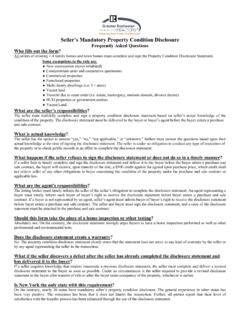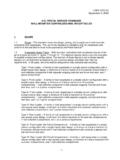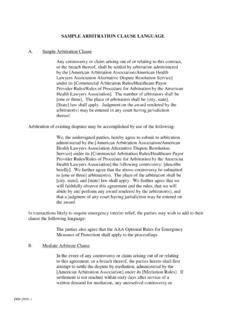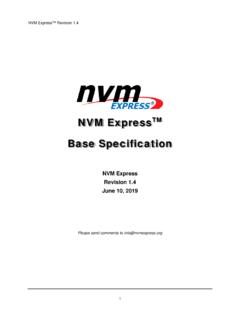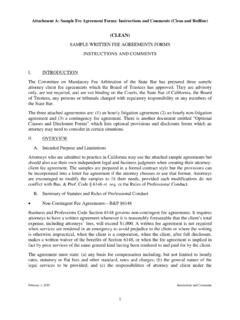Transcription of RELIGIOUS EXEMPTION FROM MANDATORY COVID-19 …
1 Re: RELIGIOUS EXEMPTION FROM MANDATORY COVID-19 VACCINATION Dear _____: The purpose of this submission is to request a RELIGIOUS EXEMPTION from the recently imposed mandate to obtain a COVID-19 vaccination as a condition of my employment with _____. The reasons for my sincerely held beliefs as the basis of my EXEMPTION request follows. As you should know, the United States Equal Employment Opportunity Commission ( EEOC ) issued revised guidance with respect to attempts by employers to mandate COVID-19 vaccination as a condition of employment. EEOC s guidelines are binding . The most recent EEOC guidance, to which you are bound, states as follows: Title VII and the ADA require an employer to provide reasonable accommodations for employees who, because of a disability or a sincerely held RELIGIOUS belief, practice, or observance, do not get vaccinated for COVID-19 , unless providing an accommodation would pose an undue hardship on the operation of the employer s business.
2 The analysis for undue hardship depends on whether the accommodation is for a disability (including pregnancy-related conditions that constitute a disability) (see ) or for religion (see ). As with any employment policy, employers that have a vaccine requirement may need to respond to allegations that the requirement has a disparate impact on or disproportionately excludes employees based on their race, color, religion, sex, or national origin under Title VII (or age under the Age Discrimination in Employment Act (40+)). Employers should keep in mind that because some individuals or demographic groups may face greater barriers to receiving a COVID-19 vaccination than others, some employees may be more likely to be negatively impacted by a vaccination requirement.
3 It would also be unlawful to apply a vaccination requirement to employees in a way that treats employees differently based on disability, race, color, religion, sex (including pregnancy, sexual orientation and gender identity), national origin, age, or genetic information, unless there is a legitimate non-discriminatory reason. What are some examples of reasonable accommodations or modifications that employers may have to provide to employees who do not get vaccinated due to disability; RELIGIOUS beliefs, practices, or observance; or pregnancy? (5/28/21) An employee who does not get vaccinated due to a disability (covered by the ADA) or a sincerely held RELIGIOUS belief, practice, or observance (covered by Title VII) may be entitled to a reasonable accommodation that does not pose an undue hardship on the operation of the employer s business.
4 For example, as a reasonable accommodation, an unvaccinated employee entering the workplace might wear a face mask, work at a social distance from coworkers or non-employees, work a modified shift, get periodic tests for COVID-19 , be given the opportunity to telework, or finally, accept a reassignment. EEOC Guidance What You Should Know About COVID-19 and the ADA, the Rehabilitation Act and Other EEO Laws (Updated June 28, 2021, Technical Assistance Questions and Answers) (emphasis added). In its March 2021 statement and guidance to the Catholic Church, the Council of Bishops recommended avoiding the Johnson & Johnson vaccine if possible because it raises questions about the moral permissibility of using vaccines developed, tested, and/or produced with the help of abortion-derived cell lines.
5 Further, the Archdiocese of New Orleans calls the Johnson & Johnson vaccine morally compromised due to its abortion ties. It is well-documented fact that the Johnson & Johnson vaccine utilized abortion-derived cell lines (cell line ) in both its development and manufacturing of the COVID-19 vaccine. originated from human embryonic retinal cells that were isolated from an 18-week-old, aborted fetus in 1985. According to an FDA transcript of the Vaccines and Related Biological Products Advisory Committee Meeting on May 16, 2001, Dr. Alex J. Van Der Eb discussed the origins and characteristics of cell line , in part, as follows: So I isolated retina from a fetus, from a healthy fetus as far as could be seen, of 18 weeks old.
6 There was nothing special with a family history or the pregnancy was completely normal up to the 18 weeks, and it turned out to be a socially indicated abortus abortus provocatus, and that was simply because the woman wanted to get rid of the fetus. * * * * * The father was not known not to the hospital anymore, what was written down was unknown father, and that was, in fact, the reason why the abortion was requested. See, FDA transcript (June 6, 2001), pp. 91, 99. Comments by Dr. Van Der Eb, Crucel, Nevada. Moderna and Pfizer, while not using fetal cell lines during the actual development or production phases of their COVID-19 vaccines, did use the fetal cell line HEK-293 in the confirmation phase to ensure the vaccines efficacy.
7 These Human Embryonic Kidney ( HEK ) cell cultures originated from the 293rd experiment ( 293 ) of a female aborted fetus in 1973. In discussing the development and origin of the HEK-293 cell line in the 2001 FDA transcript, Dr. Van Der Eb stated: The 293 cell was made by Frank Graham in 1973 from human embryonic kidney cells that were made from fetal tissue one year ago by myself one year before that, so that was in 19 probably in * * * * * The reasons for the abortion were unknown to me. I probably knew it at that time, but it got lost, all this information. Id. at pp. 77, 81.
8 Title VII of the 1964 Civil Rights Act gives workers the right to seek an exception to a vaccination mandate based on their RELIGIOUS beliefs. The Equal Employment Opportunity Commission, which enforces Title VII, defines religion beyond membership in a church or belief in God, to encompass RELIGIOUS beliefs to include: ..theistic beliefs as well as non-theistic moral or ethical beliefs as to what is right and wrong which are sincerely held with the strength of traditional RELIGIOUS views. Title VII, Section 12 (emphasis added). The Supreme Court in Thomas v. Review Bd., Ind. Empl.
9 Sec. Div., 450 707 (1981) said that Courts should not undertake to dissect RELIGIOUS in its decision granting unemployment benefits to a Jehovah s Witness who quit his job due to his church s tenets. Although the high court s ruling dealt with the First Amendment rather than Title VII, it signaled that the judiciary generally should defer to faith claims. In summary, whether during the developmental, manufacturing or testing phases, it is evident that all three COVID-19 vaccines utilized cloned fetal cell lines originating from documented abortions. I hold very firm and sincere RELIGIOUS , moral and ethical beliefs that are adamantly opposed to the origin of the and HEK-293 cell lines.
10 I do not support abortions, nor do I wish to inject myself with any substance tied to medical research using human embryos obtained through abortion. My personal and RELIGIOUS beliefs in no way interfere with how I conduct myself on the job. In addition to my opposition of vaccines based on the origins of the derived fetal cell lines as outlined above, the Bible, which is the basis of my RELIGIOUS beliefs, teaches that while I am instructed to show respect for and obey the rules and laws of governing authorities of this land, when the laws of the land contradict the law of God, His people must obey God rather than men (Acts 5:29).
